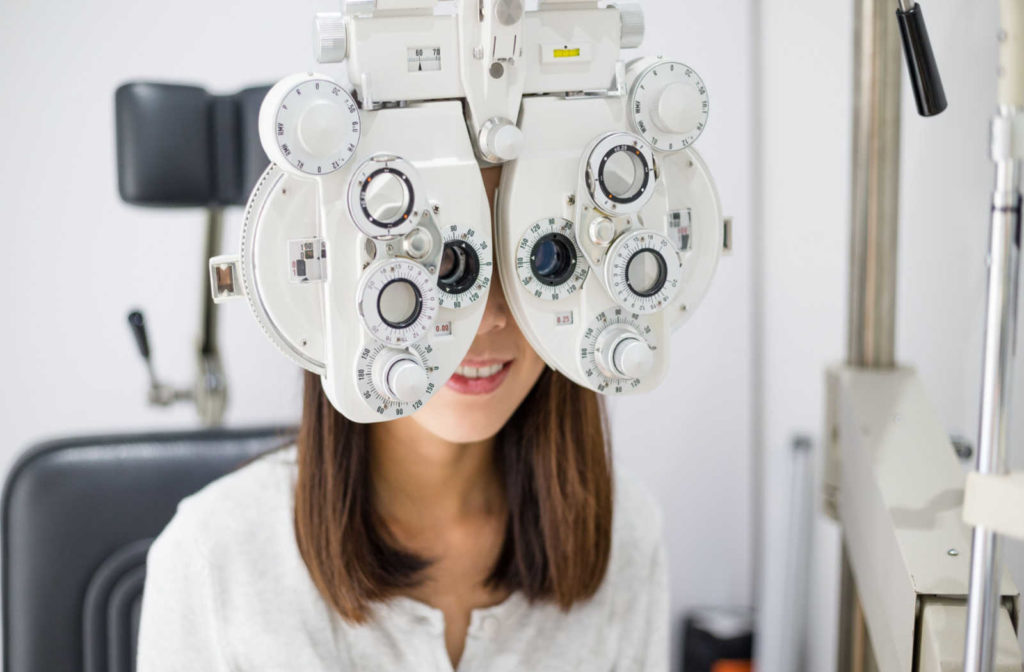Your eyes are complex and require consistent care. Regular eye exams can help manage various eye conditions and give your optometrist a chance to familiarize themselves with your vision. Astigmatism is a vision condition that can be managed and treated with consistent care.
Let’s look at what astigmatism is, the symptoms, and how to tell if you have it.
What Is Astigmatism?
Astigmatism is an imperfection in the curvature of the eye that results in blurry distance and near vision. This condition occurs when the front surface of the eye or the lens inside the eye has mismatched curves.
Instead of having one round ball-like curve, the eye’s surface is egg-shaped and causes blurred vision at all distances.
Some common signs and symptoms of astigmatism can include:
- Eyestrain or discomfort
- Blurred or distorted vision
- Squinting
- Difficulty with night vision
Astigmatism usually occurs with other vision conditions known as refractive errors, such as myopia and hyperopia. These vision conditions are referred to as refractive errors because they impact how your eyes bend or refract light.
Different causes and risk factors can contribute to developing astigmatism—these can include:
- Development following an eye injury or eye surgery
- Hereditary and usually present from birth
- Development due to a rare condition called keratoconus
In some cases, astigmatism is not severe enough to require corrective solutions, but when symptoms start detracting from your daily activities, your optometrist can help determine the best treatment option for you.

Diagnosing Astigmatism
Your optometrist can diagnose astigmatism through a comprehensive eye examination. Astigmatism testing involves measuring how your eyes focus light and determining a prescription for any optical lenses you may need to improve vision.
Your comprehensive eye exam includes:
- Your optometrist will talk with you to review your personal and family health history, your eye health, and any medications you’re taking.
- Visual acuity testing to determine your health history is correct and up-to-date.
- Eye disease screenings to help look for signs of diseases such as glaucoma, age-related macular degeneration, diabetic eye diseases, and cataracts.
- A discussion at the end of the exam to prescribe any glasses or contact lenses and give recommendations for your vision and eye health.
Through testing, your optometrist can determine what your updated prescription will be to account for astigmatism.
Treating Astigmatism
If left untreated, astigmatism can eventually lead to other conditions such as amblyopia (lazy eye) and sometimes cause eye strain and headaches.
Following your comprehensive eye examination, your updated prescription will come in handy to get new glasses that contain a special cylindrical lens prescription to compensate for astigmatism.
This special lens provides an additional power to specific parts of the lens to help clear up your vision.
Contact lenses are a popular option for people who want an alternative to glasses. With the evolutions in contact lens technology—they’re a more viable alternative to glasses than ever.
A comprehensive contact lens examination and fitting with your optometrist will be required to determine your contact lens prescription. Contact lenses sit directly on your eyes, requiring regular cleaning and maintenance to maintain eye health.
Your optometrist will walk you through proper contact lens maintenance to help preserve your eye health.
There are other options for astigmatism treatment, such as refractive vision correction surgery, but these options require a full consultation with your optometrist.
Consistent Vision Care
Managing and treating astigmatism as soon as possible can help you regain your clear vision once again. Your optometrist can update your prescription through a comprehensive eye exam to account for astigmatism. Book an appointment with your optometrist and get your comprehensive eye exam if you suspect you have astigmatism.



